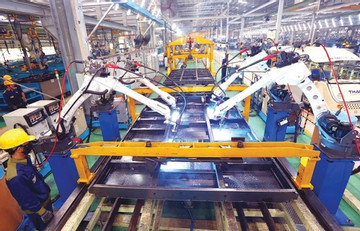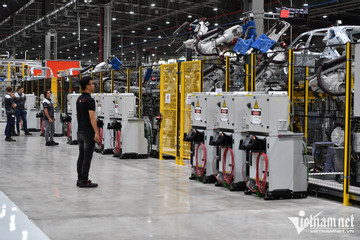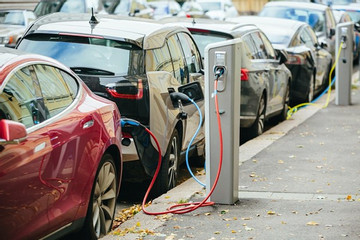- © Copyright of Vietnamnet Global.
- Tel: 024 3772 7988 Fax: (024) 37722734
- Email: evnn@vietnamnet.vn
vietnam's automobile industry
Update news vietnam's automobile industry
Difficulties encircle the Vietnamese automobile industry
Automobile manufacturers have once again proposed an extension of the luxury tax payment deadline and 50 percent vehicle registration tax cut for domestically assembled cars.
Hybrid vehicle sales boom amid fuel shortage
Though technical barriers exist and there is a shortage of charging stations, hybrid Electric Vehicles are a good choice for markets like Vietnam.
Vietnam auto makers project bumpy years ahead
Car manufacturers are calling for the reinstatement of measures used during the pandemic in order to help boost flagging vehicle sales.
Low localisation rate hindering progress
A stronger supporting industry and focus on boosting localisation rates is deemed a prerequisite to help brands increase production and also reduce costs.
Government asked to devise 50 per cent cut on auto registration fee
The Government has asked the Ministry of Finance and other relevant ministries to devise a 50 per cent cut on auto registration fees for locally...
Automakers react to statement that 'VN can only make screws for vehicle number plates'
Vietnamese automobile manufacturers have had strong reactions to the comment by an analyst that the country's automobile industry is nothing more than the production of screws for vehicle number plates.
'Vietnam can only produce screws for car license plates': professor
A speech by Assoc. Prof. Dr. Phan Dang Tuat, Chairman of the Vietnam Association for Supporting Industries (VASI), has raised controversy after he reportedly stated that Vietnam can only make screws for car license plates.
VN auto sales growth may slow after record 2022: experts
Vietnam’s auto industry broke its sales record last year with its highest revenue and profit. This year, sales growth is expected to slow due to many negative issues, auto experts predict.
Nearly 200 businesses to join Autotech & Accessories show 2023
The 19th Vietnam International Autotech & Accessories Show will take place from May 18-21 in Ho Chi Minh City, expecting 300 booths organised by nearly 200 businesses.
Car prices fall sharply in the first months of the year
A number of large manufacturers slashed car prices early this year, signaling fierce competition in the Vietnamese auto market.
Automobile market's prospects for 2023
The automobile market is not likely to see a boom as it did in 2022. The difficulties arising late last year are expected to last until mid year.
Automobile sales record made in 2022
With 500,000 cars sold in 2022, Vietnam’s automobile market hit a milestone on the path to become one of the largest automobile markets in Southeat Asia, besides Thailand, Indonesia and Malaysia.
Vietnam posts all-time high auto imports in 2022
Vietnam posted an all-time high import of automobiles with 173,467 units valued at 3.84 billion USD last year, surpassing the previous record of about 160,000 units in 2021, reported the General Department of Vietnam Customs.
Vietnam earns US$10.79 billion from auto accessories exports
The nation raked in more than US$10.79 billion from exporting auto accessories and vehicles during the initial 11 months of the year, up 13.1% against the same period from last year, according to information given by the General Statistics Office.
Hybrids: first phase of green-vehicle development in Vietnam
Electric cars are a growing trend in the world market, but they require high costs and charging stations. Hybrid cars that use two or more types of power are better suited at this time.
VCCI proposes preferential electricity prices for EVs
For the Prime Minister’s draft decision on retail electricity pricing, the Vietnam Confederation of Commerce and Industry (VCCI) has proposed a pricing mechanism for electric vehicles (EVs).
Hybrid vehicles bring fresh spirit to auto industry
While the lack of charging stations could be an obstacle for the use of electric vehicles, this will not be an issue for hybrid vehicles.
Electric vehicles are here to stay
Large auto manufacturers have launched electric models in Vietnam, which indicates that replacing cars with electric vehicles will be a permanent trend.
Infrastructure crucial for e-car future
Green and cleaner transport initiatives are being promoted in Vietnam, with more top brands hoping to offer the future of electric vehicles.
VN welcomes foreign auto giants, wants to make 1 million cars a year
At least three foreign automobile manufacturers in the last year have chosen Vietnam as a potential market to seek investment opportunities and use it as a springboard to export cars to regional countries.



















